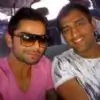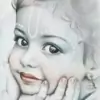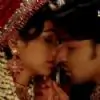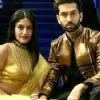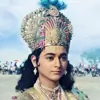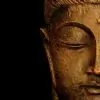Drona's son, beholding that terrible bowman coming towards him bow in hand, and the two brothers on Janardana's car, became exceedingly agitated and thought his hour had come. Of soul incapable of being depressed, he called to his mind that high weapon (which he had obtained from his sire). He then took up a blade of grass with his left hand. Fallen into great distress, he inspired that blade of grass with proper mantras and converted it into that powerful celestial weapon. Unable to brook the arrows (of the Pandavas) and the presence of those wielders of celestial weapons, he uttered in wrath these terrible words: For the destruction of the Pandavas.' Having said these words, O tiger among kings, the valiant son of Drona let off that weapon for stupefying all the worlds. A fire then was born in that blade of grass, which seemed capable of consuming the three worlds like the all-destroying Yama at the end of the yuga."
Vaishampayana said, "At the very outset the mighty-armed hero of Dasharha's race understood from signs the intention of Drona's son. Addressing Arjuna, he said, O Arjuna, O son of Pandu, the time is come for the use of that celestial weapon which is in thy memory, knowledge of which was imparted to thee by Drona. For protecting thyself as also thy brothers, O Bharata, shoot in this battle that weapon which is capable of neutralising all weapons.'
Thus addressed by Keshava, Arjuna, that slayer of hostile heroes, quickly alighted from the car, taking with him his bow with shaft fixed on the string. Softly wishing good unto the preceptor's son and then unto himself, and unto all his brothers, that scorcher of foes then bowed unto all the gods and all his superiors and let off his weapon, thinking of the welfare of all the worlds and uttering the words, Let Ashvatthama's weapon be neutralised by this weapon!'
That weapon, quickly let off by the wielder of gandiva, blazed up with fierce flames like the all-destroying fire that appears at the end of the yuga. Similarly, the weapon that had been shot by Drona's son of fierce energy blazed up with terrible flames within a huge sphere of fire.Numerous peals of thunder were heard; thousands of meteors fell; and all living creatures became inspired with great dread. The entire welkin seemed to be filled with noise and assumed a terrible aspect with those flames of fire. The whole earth with her mountains and waters and trees, trembled. Then the two great rishis, Narada, who is the soul of every
creature, and the grandsire of all the Bharata princes (Vyasa), beholding those two weapons scorching the three worlds, showed themselves there. The two rishis sought to pacify the two heroes Ashvatthama and Dhananjaya. Conversant with all duties and desirous of the welfare of all creatures, the two sages, possessed of great energy, stood in the midst of those two blazing weapons. Incapable of being overwhelmed by any force, those two illustrious rishis, placing themselves between the two weapons, stood like two blazing fires. Incapable of being checked by any creature endued with life, and adorned by the gods and danavas, they two acted in this way, neutralising the energy of the two weapons and doing good to all the world.
The two rishis said, "Those great car-warriors who have fallen in this battle were acquainted with diverse kinds of weapons. They, however, never shot such a weapon upon human beings. What act of rashness is this, ye heroes, that ye have done?"
Vaishampayana said, "At the very sight, O tiger among men, of those two rishis possessed of splendour like that of fire, Dhananjaya quickly resolved to withdraw his celestial shaft. Joining his hands, he addressed those rishis, saying, I used this weapon, saying, "Let it neutralise the (enemy's) weapon!" If I withdraw this high weapon, Drona's son of sinful deeds will then, without doubt, consume us all with the energy of his weapon. Ye two are like gods! It behoveth you to devise some means by which our welfare as also that of the three worlds may be secured!'
Having said these words Dhananjaya withdrew his weapon. The withdrawal of that weapon by the gods themselves in battle is exceedingly difficult. Not excepting the great Indra himself, there was nobody save the son of Pandu, who was capable of withdrawing that high weapon after it had once been let off. That weapon was born of Brahma energy. No person of uncleansed soul can bring it back after it is once let off. Only one that leads the life of a brahmacari can do it. If one who has not practised the vow of brahmacarya seeks to bring it back after having shot it, it strikes off his own head and destroys him with all his equipments. Arjuna was a brahmacari and an observer of vows. Having obtained that almost unobtainable weapon, he had never used it even when plunged into situations of the greatest danger. Observant of the vow of truth, possessed of great heroism, leading the life of a brahmacari, the son of Pandu was submissive and obedient to all his superiors. It was for this that he succeeded in withdrawing his weapon.
Drona's son, beholding those two rishis standing before him, could not by his energy withdraw his own terrible weapon. Unable to withdraw the high weapon in battle, Drona's son, O king, with a cheerless heart, said unto the island-born rishi these words, Threatened by a great danger, and desirous of protecting my life, I let off this weapon, through fear of Bhimasena, O sage! This Bhimasena of false behaviour, acted sinfully, O holy one, while slaying the son of Dhritarashtra in battle! It is for this, O regenerate one, that of uncleansed soul as I am I let off this
weapon. I dare not, however, withdraw it now. Having inspired this irresistible and celestial weapon with the energy of fire, I let it off for the destruction of the Pandavas. Contrived for the destruction of the Pandavas, that weapon, therefore, will take away the lives of all the sons of Pandu. O regenerate one, I have, in wrath, done this sinful deed. I invoked this weapon in battle for the destruction of the Pandavas.'
Vyasa said, "Pritha's son Dhananjaya, O child, was acquainted with the weapon called brahmashira. Neither from wrath, nor for thy destruction in battle, did he shoot this weapon. Arjuna, on the other hand, used it for baffling thy weapon. He has again withdrawn it. Having obtained even the brahmastra through thy sire's instructions, the mighty-armed Dhananjaya did not fall off from a kshatriya's duties. Arjuna is possessed of such patience, and such honesty. He is, besides, conversant with every weapon, Why dost thou seek to compass the destruction of such a person with all his brothers? That region where the weapon called brahmashira is baffled by another high weapon suffers a drought for twelve years, for the clouds do not pour a drop of water there for this period. For this reason, the mighty-armed son of Pandu, although he had the power, would not, from desire of doing good to living creatures, baffle thy weapon with his. The Pandavas should be protected; thy own self should be protected; the kingdom also should be protected. Therefore, O thou of mighty arms, withdraw this celestial weapon of thine. Dispel this wrath from thy heart and let the Pandavas be safe. The royal sage Yudhishthira never desires to win victory by perpetrating any sinful act. Give unto these that gem which is on thy head. Taking that, the Pandavas will in return grant thee thy life!"
Drona's son said, "This my gem is more valuable than all the wealth that has ever been earned by the Pandavas and the Kauravas. If this gem is worn, the wearer ceases to have any fear from weapons or disease or hunger! He ceases to have any fear of gods and danavas and nagas! His apprehensions from rakshasas as also from robbers will cease. Even these are the virtues of this gem of mine. I cannot, by any means, part with it. That, however, O holy one, which thou sayest, should be done by me. Here is this gem. Here is myself. This blade of grass (inspired into a fatal weapon) will, however, fall into the wombs of the Pandava women, for this weapon is high and mighty, and incapable of being frustrated. O regenerate one, I am unable to withdraw it, having once let it off. I will now throw this weapon into the wombs of the Pandava women. As regards thy commands in other respects, O holy one, I shall certainly obey them."
Vyasa said, "Do then this. Do not, however, entertain any other purpose, O sinless one! Throwing this weapon into the wombs of the Pandava women, stop thyself."
Vaishampayana continued, "The son of Drona, having heard these words of the island-born, threw that uplifted weapon into the wombs of the Pandava women."
Vaishampayana said, "Understanding that that weapon was thrown (into the wombs of the Pandava women) by Drona's son of sinful deeds, Hrishikesha, with a cheerful heart, said these words unto him: A certain brahmana of pious vows, beholding Virata's daughter who is now daughter-in-law to Arjuna, while she was at Upaplavya, said, "While the Kuru line will become extinct, a son will be born to thee. This thy son for that reason, will be called by the name of Parikshit." The words of that pious man shall become true: the Pandavas shall have a son called Parikshit. Unto Govinda, that foremost one of the Satvata race, while he was saying these words, Drona's son, filled with wrath, replied, saying, This, O Keshava, that thou sayest from thy partiality for the Pandavas, shall not happen. O thou of eyes like lotus-petals, my words cannot but be fulfilled. Uplifted by me, this weapon of mine shall fall on the foetus that is in the womb of Virata's daughter, upon that foetus which thou, O Krishna, art desirous of protecting.'
The holy one said, "The fall of this mighty weapon will not be fruitless. The foetus will die. But being dead, it will live again and have a long life! As regards thyself, all wise men know thee for a coward and a sinful wretch! Always engaged in sinful acts, thou art the slayer of children. For this reason, thou must have to bear the fruit of these thy sins. For 3,000 years thou shalt wander over this earth, without a companion and without being able to talk with anyone. Alone and without anybody by thy side, thou shalt wander through diverse countries, O wretch, thou shalt have no place in the midst of men. The stench of pus and blood shall emanate from thee, and inaccessible forests and dreary moors shall be thy abode! Thou shalt wander over the Earth, O thou of sinful soul, with the weight of all diseases on thee.
The heroic Parikshit, attaining to age and a knowledge of the Vedas and the practice of pious vows, shall obtain all weapons from the son of Sharadvata. Having obtained a knowledge of all high weapons, and observant of all kshatriya duties, that righteous-souled king shall rule the earth for sixty years. More than this, that boy shall become the mighty-armed king of the Kurus, known by the name of Parikshit, before thy very eyes, O thou of wicked soul! Though burnt by the energy of thy weapon's fire, I shall revive him. O lowest of men, behold the energy of my austerities and my truth."
Vyasa said, "Since, disregarding us, thou hast perpetrated this exceedingly cruel act, and since thy behaviour is such although thou art a good brahmana (by birth), therefore, those excellent words that Devaki's son has said, will, without doubt, be realised in thy case, an adopter as thou hast been of kshatriya usages!"
Ashvatthama said, "With thyself among all men, O holy one, I shall live! Let the words of this illustrious and foremost of men become true!"
Vaishampayana continued, "Drona's son, then, having made over his gem to the high-souled Pandavas, cheerlessly proceeded, before their eyes, to the forest. The Pandavas who had killed and chastised all their foes, placed Govinda and the island-born Krishna and the great ascetic Narada at their head, and taking the gem that was born with Ashvatthama, quickly came back to the intelligent Draupadi who was sitting in observance of the praya vow.


